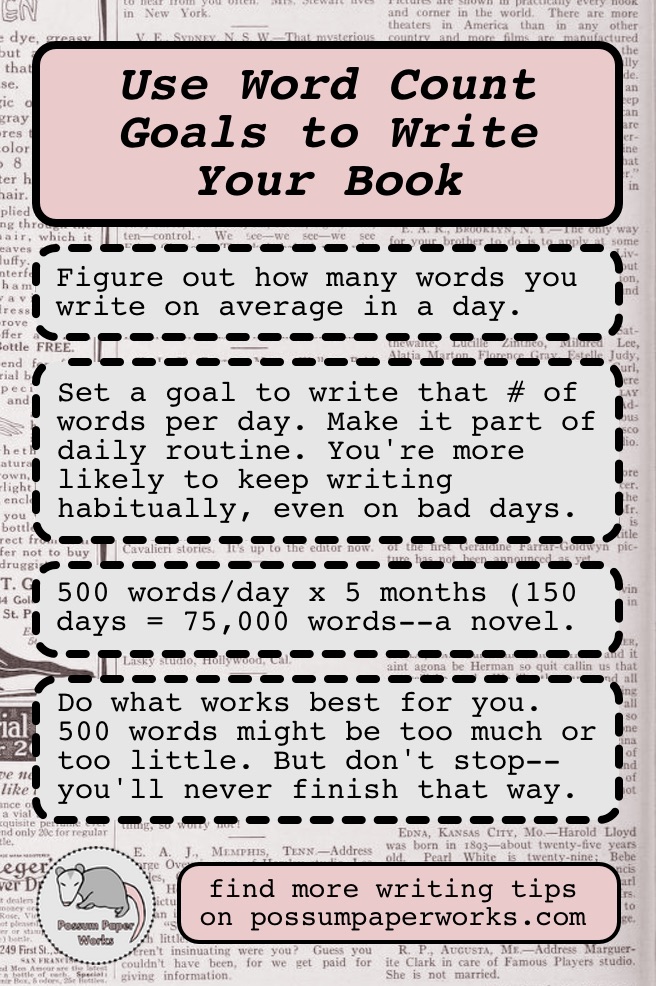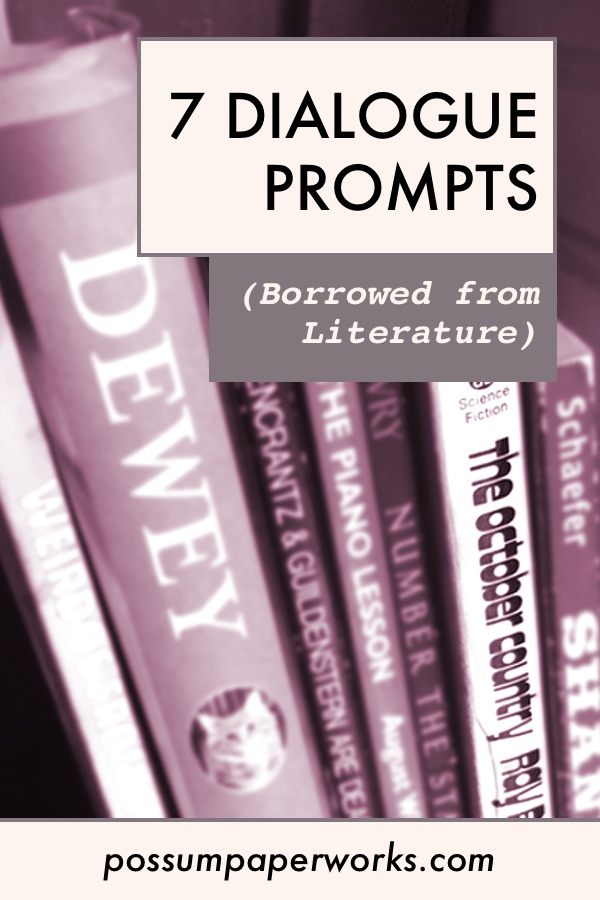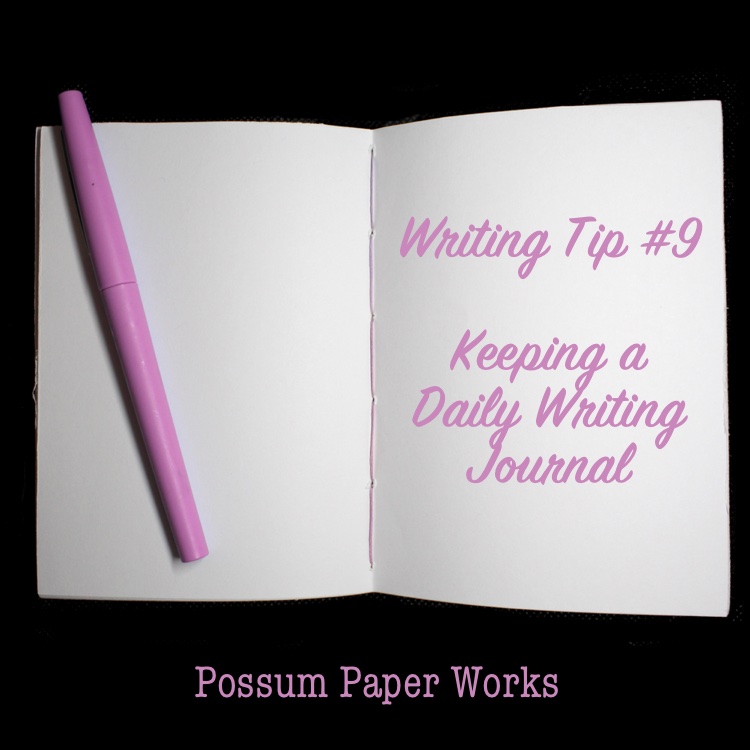
It’s finally time. Only took 9 posts for me to get to the subject that started it all for me – making my writing better by keeping a journal. Are you ready to hear this writer and bookbinder’s take? Of course you are.
Writing Tip #9 – Keeping A Writing Journal
Since May 15, 2013, I have written in a journal every day. And I mean every day. Travel, food poisoning, the flu–none of those things have stopped me yet. Even when I could barely stay awake for more than a few minutes I managed to get a few words out. Good words? Maybe not. But that’s hardly the point.
I have made writing every day, even if it’s just a line or two, part of my necessary routine. If I can hold a pen, I will write. I’m not breaking my streak for anything.
The majority of those thousands of entries aren’t accounts of my day-to-day life. No, I write about the day-to-day lives of my characters. I note the shorter stories that popped into my dreams. I wander around in the plots and details of my storylines until I have a sense of what’s going on.
It’s been more helpful to my writing than I ever could’ve imagined. All of those tips that say to write every day to improve? They aren’t kidding. I look back on my early entries and I can’t believe I wrote so poorly.
I mean, in my defense, I was 13 and mostly recording the surprisingly dramatic adventures of my toys, heavily featuring all the rubber ducks I had in the tub. The content was always going to be a little iffy. Still, there’s gold in there.
I can look at old entries and find character details buried in the action and words that I love and never would’ve been able to express back then. Even if I never use the characters again, it makes me wildly happy to read their old stories.
In more recent years, my journal has been a fantastic way to keep notes for later. A good chunk of the dialogue in the novel I wrote over the summer came almost directly from what I had written in my journal the year before.
My favorite part is always when I find something I wrote and go, “Wow, I totally forgot about that.” That’s how I know writing every night is worth it.
Why you should journal too
I’ll keep this simple. There’s a ton of reasons why you should journal, and not all of them are just regarding writing. Here’s a few:
- Writing more = better writing (usually)
- It’s a great way to keep writing if you have a day job that prevents you from having the time or energy to write.
- It keeps a record of tiny details about your stories for you to find later – continuity is helpful, y’all.
- The more you write the more you have to read a year or two down the line – reading my old journals is almost like reading a book, and it never fails to keep me entertained.
- Someday some ancestor of yours will get to read your notebook and find out what you were like. This may or may not be a bad thing, that’s up to you.
- When you’re famous and dead your family can sell your books for lots of money or make some literature scholars very happy.
- Journalling, regardless of what you write, has massive potential for positive mental health benefits.
The Writer’s Journal, The Possum Paper Works Way
Step #1 – Find a notebook you can’t wait to write in.
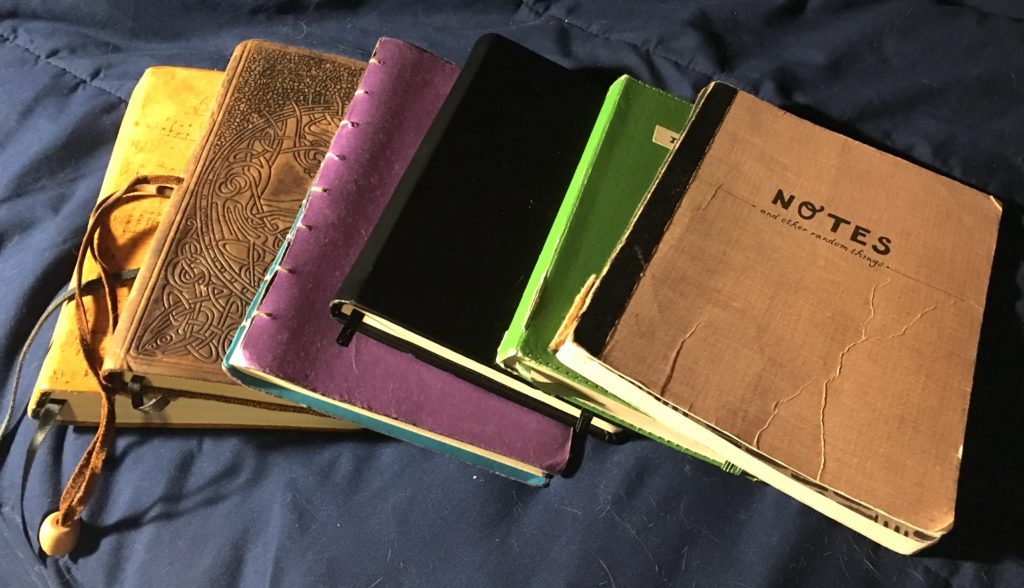
Go into Barnes & Noble (or their website) and find the leather journal that makes you swoon. Hunt down 20 cent composition books during the back-to-school season of sales. Find a journal software or app you can jive with. If you’re feeling extra awesome, order a snazzy Possum Paper Works book or a custom journal from another bookbinder!
Your journal doesn’t have to be fancy. At all. My first one was a $10 Spider-man journal from Walmart, and I got similar style books for most of the first 6 or 7 journals I filled.
Now, I love the Barnes & Noble books. I had two that I got as gifts, and my current journal is another one from their line. I spent $35 for a journal that will last me over a year now that I don’t always write a full page. It’s basically the only thing I’m willing to buy from B&N.
I like lined paper books, because I tend to write linearly when I use pen and I sometimes write more when I use paper. You might be more of a blank-page bullet journalling type (see the end of this post for more resources about that!), or your journalling might be sporadic and on-the-go and need to stay on your phone. Find the book (or app) that sounds like it’ll fill your needs the best.
You can also always make your own book. Just be aware that if you do that…you might not ever want to stop making books…
Step #2 – Figure out what time of day you’re most likely to write during.
This is dependent on a couple of factors. Mostly, you want to figure out when you’ve got at least five or ten minutes of free time, and when you’re most motivated to sit down and focus for a little bit.
I’ve kind of given up on focusing most of the time. I write while scattering back and forth between the TV, my laptop, or whatever else has my attention that night. Sometimes I do actually want to write, and suddenly find myself wishing I had more than 1 page. But I make rules for myself. No more than one page, and these days, no more than 5 entries per 2 pages. It makes sure there’s something written, no matter how short.
A neighbor of mine always writes right after she wakes up. That’s when she’s at her peak. It might work best for you too, writing a few lines before you even get out of bed.
You could write whenever, but I definitely recommend sticking to a set time whenever possible. Making it a daily routine, as regular as your cup of coffee or brushing your teeth, will help you stay with it longer, and thus write more.
Step #3 – Get to it!
Don’t sit there staring at your blank notebook. I know you don’t want to mess up the nice paper or the lovely blank screen. I get that. But come on, dude. You want to write? You’re gonna have to write.
Don’t look at me like that.
This took me nearly a week to write, okay? I get it. Writing sucks. Still. I hate to be the bearer of bad news, but…to write, you…have to write.
But it doesn’t have to be all that awful.
Journal to improve your writing – but let yourself write about anything you want.
Write about stories and character ideas. Write tiny sections of dialogue, worldbuilding, that stupid little scene where your characters make a bunch of terrible cow puns.
But write other things too. If you had a crappy day and you can’t think of anything other than whatever drama’s on your mind, write it out. If you need to work through something going on in your life, let your journal be your therapist. There’s a reason journalling is touted for its positive effects on mental health.
Plus, it’s actually a lot of fun to keep a normal “diary” journal too, even if all you write for it is one line at the start of every writing entry like I do. It can show you how far you’ve come as a person and not just as a writer.
If rules help you meet your writing goals, set rules. But don’t be afraid to break them.
Don’t get discouraged if you miss a day.
That’s okay. I promise. You’re not me. I am a dangerously stubborn being. Not everyone works at their best under pressure.
A few years ago, I had to force myself to break my own “one page a day” rule. My mental health was in the toilet, and most nights writing a full page made me feel worse with the stress of trying to come up with enough to fill a page.
One night, I decided I was done. I wrote a few lines, and stopped. I didn’t write again until the next night.
Not once have I regretted it.
Let yourself take breaks. It’s as important in journalling as in everything else in the world. Not every novel has to be a masterpiece, and not every journal entry has to be something you’ll ever look at again. That’s fine.
I promise.
Have fun with it.
Use your favorite pens. I started with Uniballs I had lying around, then got more as I found out how much I adored them. I used a red pen every fourth night to switch things up.That was the extent of the “fun” of the journal, other than the joy of writing.
About when writing started getting hard, I started using a different kind of Uniball, with a bunch of their colored Signos brightening up my collection. It made a huge difference. One night more recently I was feeling lackluster again and I used a Papermate Flair pen that I’d just gotten. I doodled all over my margins, and while my writing wasn’t as hot, the emotion was there, and I actually managed to get a bit done.
It makes a difference, if you can have a little fun with your journal. It really does.
Just remember, if it’s hurting you more than helping, stop and re-evaluate. Writing itself isn’t always fun. That doesn’t mean you have to make yourself feel worse by doing it.
Finally, it’s never a bad idea to tag your entries.
Man, I wish I had started doing this as soon as I started writing.
What I mean by tag is have some kind of short word or acronym you can use to show what you wrote about on any given day.
I have dozens and dozens of stories. The shorter ones don’t tend to get tagged, but if it’s taking up more than three nights of writing, I try to always put a little note up by the date of the entry that tells me what the story or universe I’m writing about is.
If that tag’s not there, and I’m trying to find a specific bit of information, I’ll fly right by the page and never find it. When you’re dealing with hundreds of entries, that’s not ideal. At all. Trust me on that.
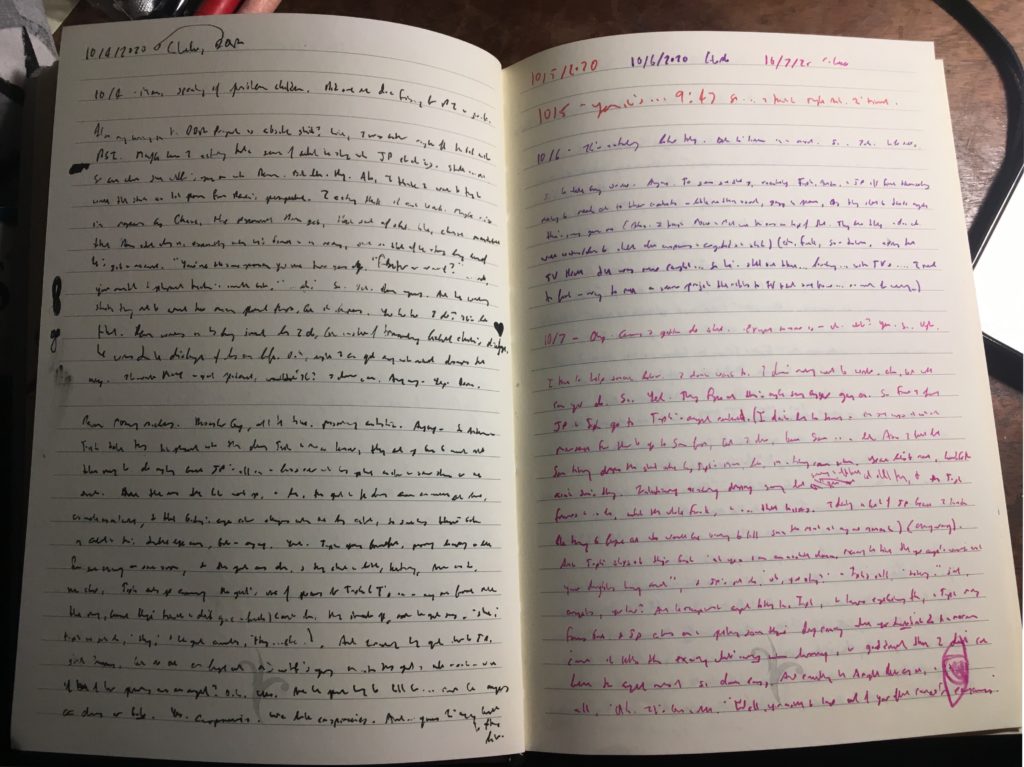
Need more inspiration?
Not enough guidelines? Not the type of journalling you’re interested in? Don’t despair!
My own Pinterest board of journal inspirations has tons of images and how-to guides sure to inspire your own notebooks, so be sure to check it out!
Here’s a couple of writers with their own tips on keeping a journal:
This post looks at a more traditional style of keeping a writer’s journal – and has free journalling resources.
A collection of 7 categories of things to put in your journal.
How to use bullet journalling methods for writing!
A super in-depth look at Megan’s personal writing journal, filled with tips and tricks for you to borrow.
Happy writing!
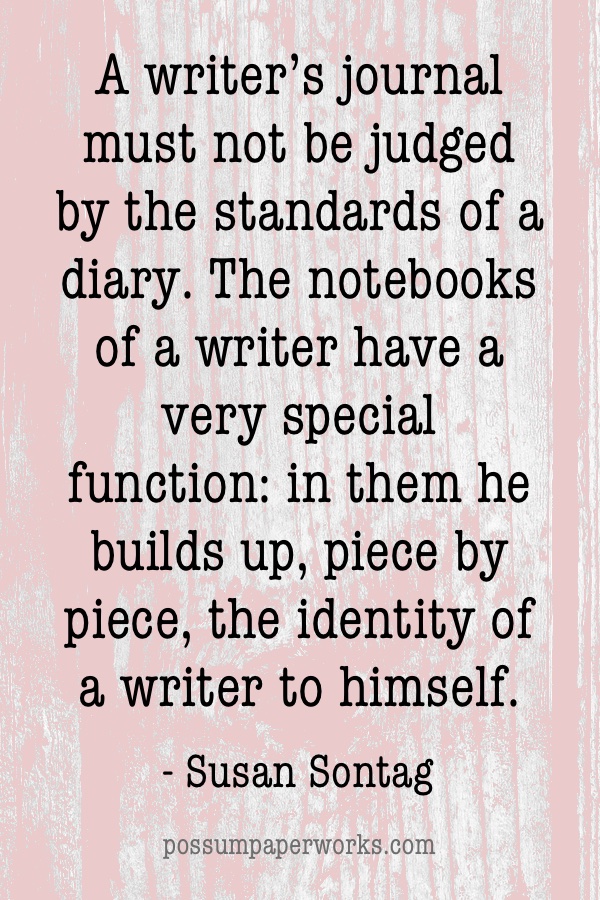
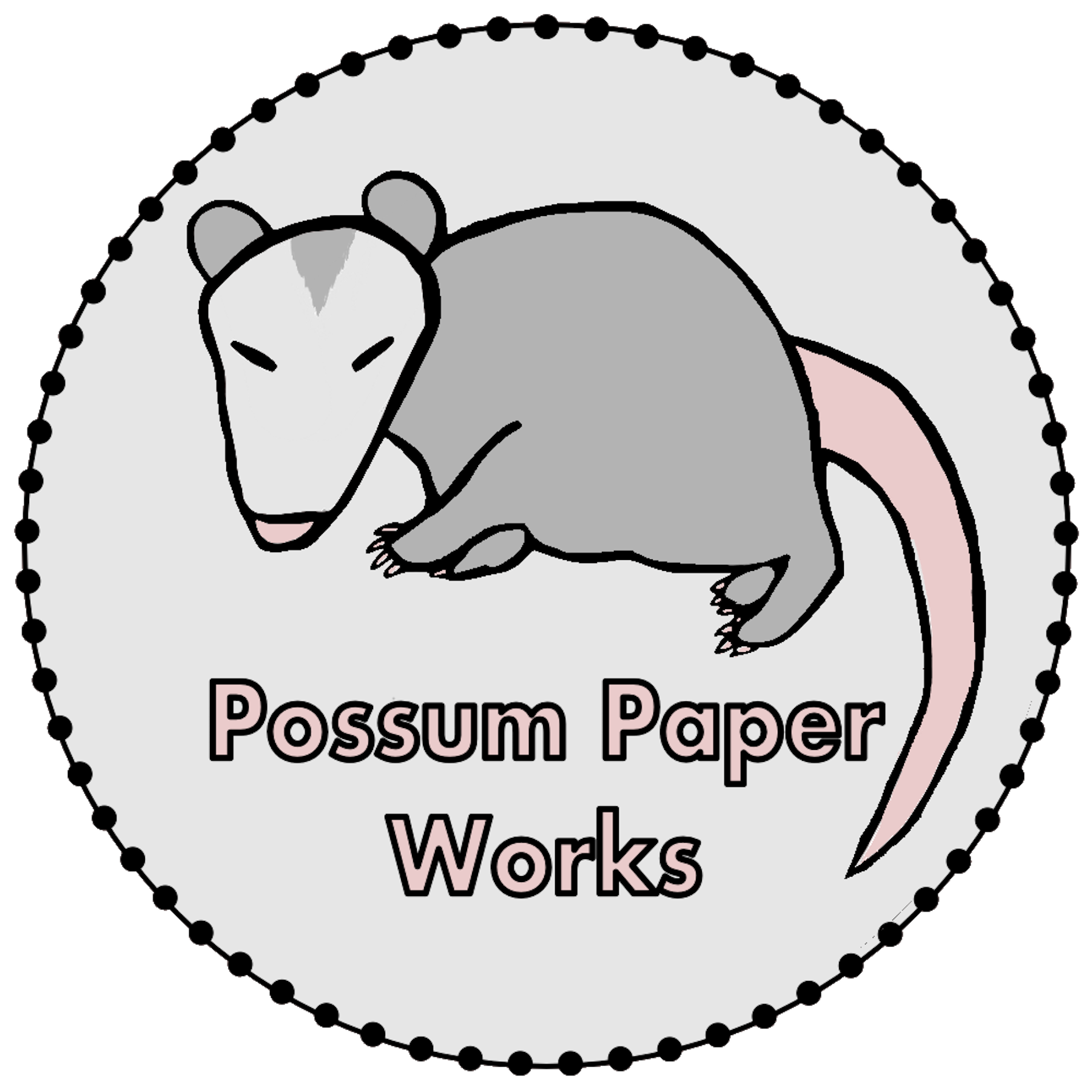
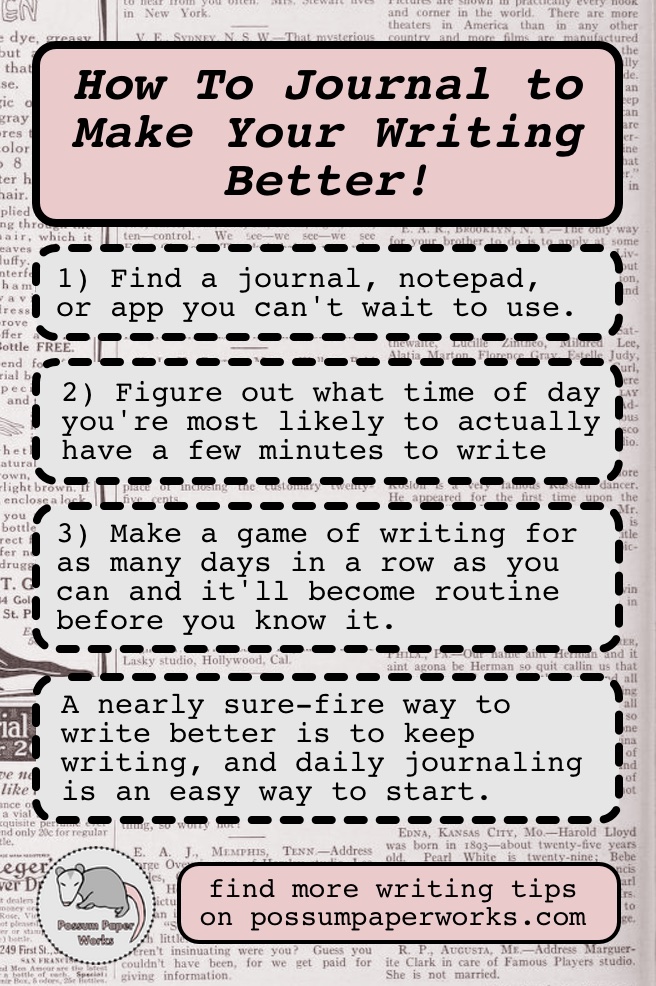
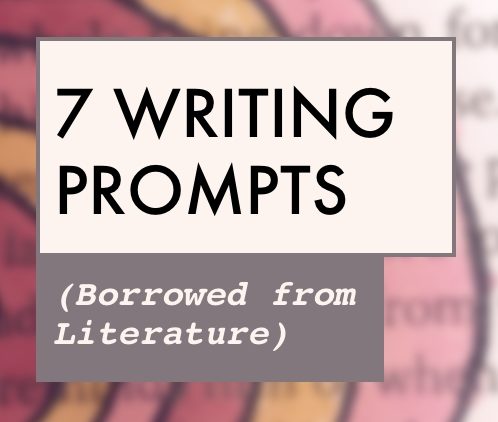
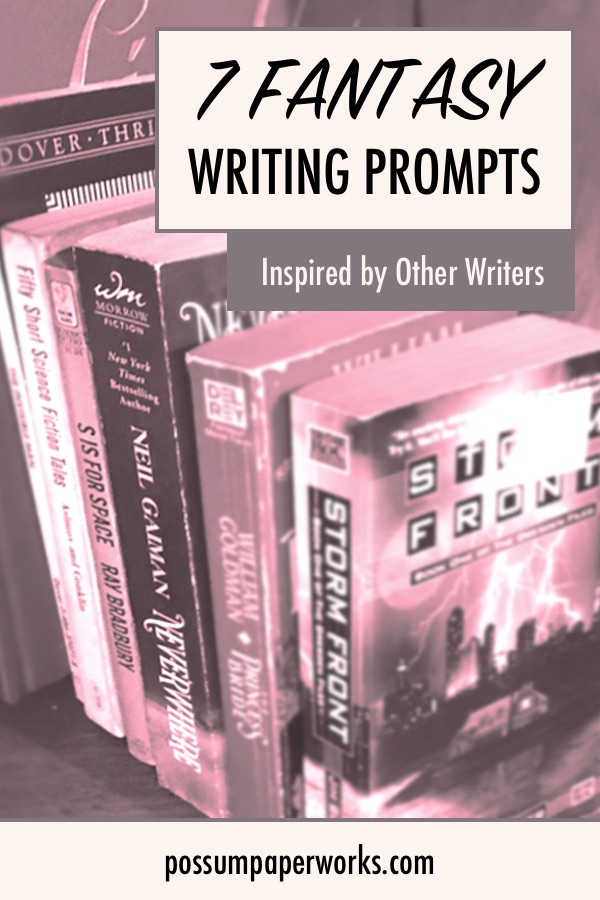

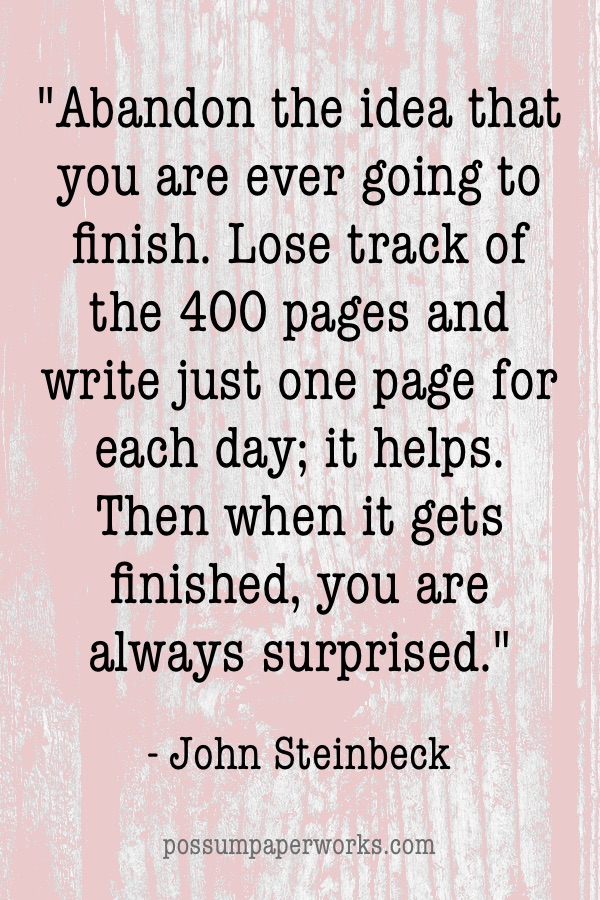
!["If you write 10k [words] a day, you will end up with a book. If you write 1k a day, you will end up with a book. If you write 500 words every Tuesday, you will end up with a book. If you write 100 words before bed, or 50 whenever you can, you will end up with a book. The only way you won't end up with a book is if you quit." - VE Schwab](https://possumpaperworks.com/wp-content/uploads/2020/08/quote_schwab.jpg)
